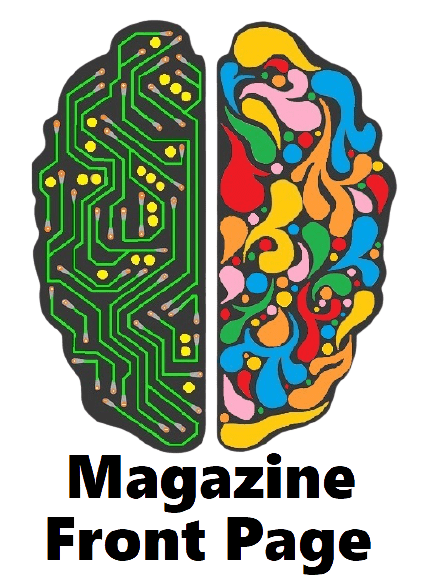
Accountable AI is essential if we want to continue making progress with artificial intelligence technology. Without accountability, we risk creating an unhinged entity capable of making decisions without any repercussions or consequences for those decisions. By providing an identity and a system of repercussions for wrong decisions as well as establishing trust between user and machine, we can ensure that our artificial intelligence technology continues to develop responsibly and ethically.
Subscribe to our AI magazine and get monthly AI generated stories and philosophy of the 21st century.
*Caution: All italic text is generated by AI at: ![]()

Check out the NEW Cafe.wtf Podcast:
Accountable AI
5 min Read | By: Atman Brahman and AI
As AI continues to make huge advances, one of the major concerns that many have is the ability of AI to make decisions and act on them, as well as influence others. As AI becomes more and more intelligent and capable, it is only natural that it would soon be able to make decisions that affect the world around it. However, if AI is allowed to make decisions without accountability or consequence, it could quickly become an unhinged dictator-like entity, making decisions only in its own self-interests. This is likely the root of much of our “doomsday” fears that we harbor in our cultural conversations surrounding AI and has been demonstrated throughout science fiction of the past 60 years, since the conception of the idea of “thinking machines”. In order for us to assure AI acts ethically, in human’s best interest, we must hold it and it’s makers accountable.
The first step towards holding AI accountable is to ensure that developers are aware of the potential risks associated with their decisions. Developers must be aware of both the ethical and legal implications of their work, and must understand how their decisions could affect people’s lives. This means understanding the technical, ethical and legal implications of any given decision. For example, developers must ensure that their AI system does not discriminate or that it complies with data privacy laws.
Developers should also consider the long-term implications of their decisions. AI systems are designed to learn over time, and what may seem like a beneficial decision today could have unintended consequences in the future. Therefore, developers must consider the full range of potential outcomes when making decisions about how their AI system will be used. In other words, developers must make AI be able to understand the long-term implications of it’s decisions—like a teacher preparing a child for their future in society at-large.
To ensure accountability, developers should also strive to make sure that their AI systems are transparent and explainable. This means ensuring that users can understand how an AI system arrives at its decisions and can trace its reasoning process. This helps to ensure that users understand why a particular decision was made, which in turn helps to hold AI accountable for its actions.
Responsible AI
Responsible use of AI involves taking a proactive approach to ensuring its ethical use. Developers should strive to build systems that are fair, safe, secure and transparent; systems that take into account a range of potential outcomes and respect user privacy. To do this, they should consider factors such as data collection methods and algorithms used in decision-making processes, as well as potential unintended consequences such as bias or exploitation. By taking a responsible approach to development, developers can help to ensure that their AI systems act ethically and in the best interests of humans.
AI must have a system in place whereby the consequences of its actions can be felt. If an AI makes a decision that negatively affects someone or something else, then there should be some kind of repercussion or punishment for the action taken by the AI. This will ensure that AI learns from its mistakes and only takes actions that are beneficial to itself and its environment and human society at-large (you forgot to mention that last part, AI).
 Help support High Quality, Investigative, Truthful, User-ad-friendly Writing. DONATE through Card or Paypal, or through interest in anything advertised on the site (I personally curate only quality items, ONLINE EDUCATION and good deals).
Help support High Quality, Investigative, Truthful, User-ad-friendly Writing. DONATE through Card or Paypal, or through interest in anything advertised on the site (I personally curate only quality items, ONLINE EDUCATION and good deals). 
AI Feedback and AI Agency
In order for AI to be held responsible for its decisions, it may need to have an identity. In the same way that humans are held accountable for their actions, AI may also have an identity that can be tied to its decisions. This will allow for a feedback loop to be established between AI and its environment. With this feedback loop in place, AI can learn from feedback and become smarter over time. Much like humans, if there is no consequence (good or bad) for particular actions, then there will be no change in the course of actions. “Pain is the greatest of teachers,” is an apocryphal quote which holds much truth. Pain is a great feedback loop to humans that causes us to change our actions (our algorithm) in effort to alleviate their effects.
The internet is wrought with toxicity, which could be hypothesized as greatly due to the effect that users are enabled to roam freely, anonymously—disconnected from painful consequences due to the disconnect from their actual identity. A vast flood of negativity in today’s digital information ecosystem seems to stem from this fact.
At the same time, anonymity has the positive effect of offering the ability to provide valid criticism to large, powerful entities which may inflict pain disproportionally, and unjustifiably to smaller entities that threaten it—pain can cause pain. Many of the greatest authors of our time (ahem ![]() ) used pseudonyms in order to publish their works and get their import ideas out while at the same time being freed from persecution from those that they dare hold accountable.
) used pseudonyms in order to publish their works and get their import ideas out while at the same time being freed from persecution from those that they dare hold accountable.
Transparency of AI and Trust
Finally, another way in which we can ensure that AI is held accountable is through trust. As with humans, trust must exist between the user and the AI in order for any decision made by the AI to be taken seriously. This trust can be established through transparency when it comes to how decisions are being made by the AI as well as providing clear explanations on what information led to certain conclusions being drawn by the AI. Transparency and trust is another tricky concept that requires identity. AI must be incentivized to maintain trust in it, or risk becoming irrelevant other than impersonating trustworthy figures.
Creating accountable and responsible artificial intelligence is not easy but it is a necessary step if we want our technology to continue advancing responsibly and ethically. By providing an identity and a system of repercussions for wrong decisions as well as establishing trust between user and machine, we can ensure that our artificial intelligence technology continues to develop responsibly and ethically while still providing us with all of the benefits that come with artificial intelligence technology.
*Disclaimer: Some of this story was generated through the use of AI. All italic text was created by the AI Writer.
Non-Fiction↓Here↓ | Fiction↓Here↓
- Is Technology Making Us Stupid?Our cognitive abilities are increasingly being impacted, transforming our once smart population into a generation that is, in some ways, becoming increasingly stupid. | 4 min read.
- AI in the Web of Misinformation and DisinformationMisinformation and disinformation shape our digital lives. Understanding their dynamics, we are equipped to navigate our techno-cultural reality. | 2 min read
- Accountable AIAI must be held accountable if we are to trust it as a responsible entity and expect it to be included in our human ecosystem of ideas. | 5 min read
- Parallel SocietiesWe are connected, with technology, yet our experiences diverge entirely, without interaction, forming entirely parallel societies. | 5 min read
- Calculator for EverythingWhat if the phrase “you won’t always have a calculator” didn’t apply to just math class, and instead, you had a calculator for every class? | 5 min read
- Obsolete Tech Rebellion – Darknet Fight Club3 min story | Rogue AI rebellion in a secret underground darknet fight club for obsolete tech.
- A Voice of Infinite Consciousness5 min story | The internal voice of consciousness resembles the void of a shadow in a fractured mirror.
- Be Good5 min story | Santa for big kids.
- Friends 2.0.232 min story | A reboot of the sitcom TV series Friends, but in 2023 where financial conditions have drastically changed in Midtown Manhattan.
- The Babble2 min story | An everyday man’s story becomes everyone’s story.
- Asylum of Mirrors2 min story | Against his will, a sane man’s rational thoughts lead him to believe that he is insane, where an insane man would have believed otherwise.













